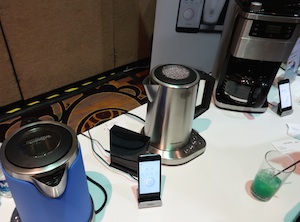
The pot calls the kettle back.
The 2015 Consumer Electronics Show will be about networked wristbands and coffee pots, if CES Unveiled – the opening press group grope – is anything to judge by. Wearables and home automation – products that lived in a geek ghetto only a couple of years ago – are the hot new categories this year.
Contenders in the wearable fitness tracker category seem to be following a common path: cram some sensors and a Bluetooth module into a sleek looking wristband, write iOS and Android apps to talk to it, then beef it up with some server-side analysis. It’s too early in the show – pre-show, actually – to know which ones are potential champs, but if tonight’s hopefuls are any indication, the winners will be determined by branding and distribution, and not by unique features and functionality.
Tomorrow is when the big boys come out and play. Samsung, LG, Panasonic, Sony and the rest will have their media extravaganzas, and one thing I’ll be looking for is whether they’ve decided to go large on wearables.
Home automation is heading away from systems built around multipurpose consumer hubs or third-party management, and toward a one-off device to cloud server to smart phone app model. Or even, it seems, to a direct device to smart phone connection.
I say seems because it often take several minutes of cross examination and an escalation from the public relations rep to the designated techie to wring an admission that the control loop involves a trip to the company’s servers. And there were just too damn many to drill down that far on all of them. But at least a couple – Kwikset’s Kevo line and Smarter’s WiFi enabled kettles and coffee makers – are making a direct connection.
From the consumer’s point of view, there’s no big picture, just a collection of apps on your smart phone screen that control appliances, locks, lights, whatever. Which looks to be consolidation enough for most people.
The leader in the one-hub-to-rule-them-all derby – Lowes – was promoting the virtual reality shopping system developed by its Innovation Lab and not the Iris home automation platform. It doesn’t necessarily mean they’re pulling back on the concept, but it’s an interesting question to follow up on later in the week.
